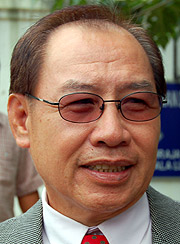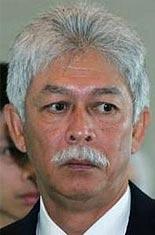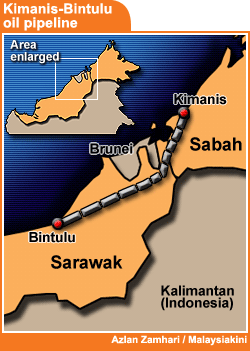PKR Sabah chief Jeffrey Kitingan has “a sneaking suspicion” that Petronas chief Hassan Merican has been less than candid in his lengthy statement on the state’s resources, which appeared in Daily Express and New Sunday Times on Sunday.
 “Petronas should be more transparent and truthful as it is dealing with a state and national resource and not a private property,” said Kitingan in an emailed statement late last night to Malaysiakini.
“Petronas should be more transparent and truthful as it is dealing with a state and national resource and not a private property,” said Kitingan in an emailed statement late last night to Malaysiakini.
“The Petronas chief should resign if the information or assessment from an independent assessor differs from his statement on Nov 16,” said Kitingan.
“If Sabah’s gas deposits are in small economically unviable and scattered pockets, why the need to exploit it, pipe it or even build a full-fledged petrochemical complex and oil refinery?
“The figures given by Petronas on its reserves and current production level do not indicate, in any way, the viability or otherwise of the oil and gas industry in Sabah.
“What it does show is that we have yet to exploit these resources, i.e. 14.5 percent of Malaysia’s total reserves versus a two per cent production.”
 According to figures released by Merican (
left
), Sabah at Jan 1, 2008 had 44 percent of Malaysia’s crude oil and condensates (2.4 billion barrels of oil equivalent per day); 14.5 percent of gas (2.1 billion bboe/12.7 tcf) and 22 percent of the nation’s combined oil and gas total.
According to figures released by Merican (
left
), Sabah at Jan 1, 2008 had 44 percent of Malaysia’s crude oil and condensates (2.4 billion barrels of oil equivalent per day); 14.5 percent of gas (2.1 billion bboe/12.7 tcf) and 22 percent of the nation’s combined oil and gas total.
So far, production from Sabah comprises 15 percent of the nation’s crude oil and condensates; two percent of the gas production and 7.7 percent of the combined oil and gas production.
Several questions arise, said Kitingan.
“We (Sabah) have oil but we only get five percent royalty. We have gas but it is being piped out. We have an oil and gas industry but little participation in its downstream activities.”
“We have substantial oil and gas reserves/deposits but we are being told that ‘you only have very little’. Petronas talks about a big royalty revenue for Sabah. Where is the logic (in all this)?” he asked.
Better to pipe it to neighbouring Sarawak
Among others, Merican also said in his Nov 16 interview that Petronas has completed plans for a full-fledged petrochemical complex in 2006 and discussed the project with Sabah Chief Minister Musa Aman.
 “It was not an afterthought,” he said, referring to the Nov 7 federal cabinet meeting which ostensibly approved a full-fledged petrochemical complex and oil refinery in Sabah in compensation for “surplus Sabah gas being shipped from Kimanis to Bintulu” after UPKO chief Bernard Dompok raised the subject of the on-off and on again gas pipeline.
“It was not an afterthought,” he said, referring to the Nov 7 federal cabinet meeting which ostensibly approved a full-fledged petrochemical complex and oil refinery in Sabah in compensation for “surplus Sabah gas being shipped from Kimanis to Bintulu” after UPKO chief Bernard Dompok raised the subject of the on-off and on again gas pipeline.
While Sabah did not request for a LNG (liquefied natural gas) plant in the state, Merican disclosed that such a plant was considered, found to be not economically viable – especially in view of existing facilities in Bintulu, Sarawak.
The proposal was scrapped in favour of the only practical idea - ship Sabah’s gas to Bintulu and use the rest to support downstream gas industries at the planned full-fledged petrochemical complex in Bintulu.
Petronas has plans for a oil and gas terminal (SOGT) on 250 acres in Kampung Takis, Kimanis, Papar.
Its principal activities will be to receive, store and export crude oil from the offshore fields. SOGT will also receive, process, compress and transport gas from the offshore fields through a 500km pipeline to Petronas’ MNLG (Malaysian Liquefied Natural Gas) complex in Bintulu.
The designed capacity is 300,000 barrels of oil per day and 1.25 billion standard cubic feet of gas per day. The storage capacity for crude oil is 2.5 million barrels. Construction started in June last year and operations will commence in January 2010.
Sabah’s infrastructure still backward
Merican did not explain why oil-and-gas related industries have been developed in non-oil states like Pahang, Malacca, Kedah and Johor while such industries are lacking in Sabah, which has most of Malaysia oil reserves.
Neither did he touch on the electricity shortage along the eastern seaboard of Sabah which necessitates the setting up of a gas-fired plant along the West Coast to generate electricity for the east coast.
The lack of supporting infrastructure – not up to world-class standard – like water and related facilities for the oil and gas industry in Sabah, appears to be a major problem holding back the state in these industries, judging from Merican’s assessments.
“All the facilities we have built are world class because this is a global business,” said Merican. “The ability to bring in the big players is crucial.
“People always criticise Petronas. They say we keep things quiet. But in this industry, this is how we do it.”

